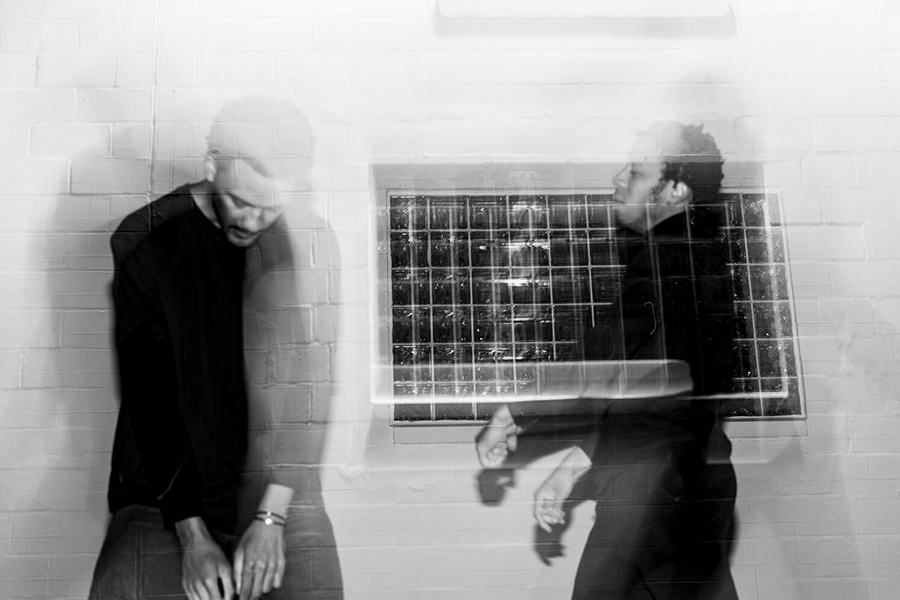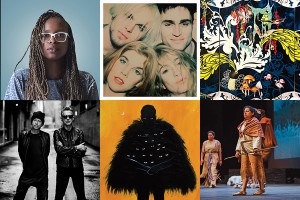My Life in the Age of COVID: Camp Blood
"When I go outside, it just feels illegal."

Photo by J. R. Alexander
As the COVID-19 pandemic upends every aspect of Boston life, we’re checking in with some local residents to learn how they’re processing our new normal. They’ll share serious thoughts on their concerns for the city—and yes, some silly recommendations on what to binge-watch, too. For the rest of the series, click here.
As a Massachusetts native, I’m pretty thrilled whenever I see local artists on the up and up—so seeing local duo Camp Blood’s name stacked amongst the myriad of musicians scheduled to take over Harvard’s Athletic Complex at Boston Calling this May was exciting. The group, which is composed of Haasan Barclay and Shaka Dendy, focuses on vocalizing the contemporary Black experience as well as the forces that work against the Black community’s survival. They’re known for their fearlessness in tackling complex subjects about the socioeconomic status of Black people, asking questions about what capitalism has done for Black people, done to Black people, and what it is without Black people’s participation. The duo is planting seeds for redefining the music landscape in Boston, not just from their direct message as a musical group, but from their willingness to be untethered from genre in their music, which can contain elements of everything from metal to hip hop. Seeing them rewarded with a platform like Boston Calling lineup felt like real progress for both the city and the group, even if the festival ended up getting canceled. I called them up to see how they’re coping with quarantine.
What is your level of concern right now?
Shaka Dendy: I think it’s reasonably high. I know people who are have been sick or passed already. My mom is in Florida, but she got tested and was fine. [Here in Boston], I’m pretty comfortable, but just a larger sort of general concern about the world.
Haasan Barclay: I feel like I can’t be bothered to be concerned about the world [at large] right now. Because there are so many people who are just willingly not caring. I’m really just worrying about my family and people I care about.
Do you feel like there’s a lot of that happening?
HB: Honestly, the people that I know have been pretty responsible about it. But, I’ve had friends of friends just going to stay with people they just met or just still trying to leave the state. [I wonder], what are you really trying to do right now? If people don’t care about their lives, I can’t really be mad at that, I guess.
SD: People have a hard time seeing that it’s so spread out. I saw this thing that the artist Kevin Beasley posted [on Instagram] about the Vietnam War Memorial. It’s that long, black stone inscription with 58,000 names of all the people that died in the Vietnam War. And by May 1, we were projected to have 60,000 deaths. So more than the Vietnam War, but I think because it’s spread out, and it’s not some violent explosion, it’s harder for people to grasp just how many people are dead. It’s just invisible and sort of dispersed across the entire world. Maybe it’s harder for it to connect and feel as intense as when a [singular] event happens.
How have you guys been coping so far?
HB: I’ve been working out a lot. I’m staying with my mom, so it’s nice to be around family. I’m making a lot of music. I just fixed my bike up. There is way more space to move around and avoid people—I biked in the woods yesterday.
SD: Yeah, I don’t know how I’m coping honestly. The days keep coming, and I’m still here. I left Boston kind of at the beginning of all this thinking I could dodge it. Then I came back here the day before the official lockdown started. I was spending most of my time in my studio to stay away from everyone to self-isolate, kind of assuming that I’ve been exposed to [COVID-19] in travel.
I don’t love having so much idle time. I work to do things to stay active and engaged so that I’m not sitting around—it’s not good. But, I mean, that’s just where the whole world is. I have a hard time orienting myself and my experience in this relative to the collective experience. Like, I lost my job, which sucks, but so did 7 million other people. So, what does that really mean at this point? Can I even really care about that? I don’t know. I’m still here, days keep coming.
HB: I’ve been thinking about that, too. Like, what does it mean to be broke right now? What does money even mean right now? None of that really matters because there are so many people dying. The government’s still trying to make it work. They’re still trying to [do] capitalism right now. This isn’t the time or place for that.
SD: I think when this first kicked off, there was a scramble of like, “Oh my god, everything’s canceled, what do we do, let’s just do everything online.” And I was having a hard time with that because, again, it feels like a very reflexive capitalist kind of instinct to immediately commodify the thing and become productive instead of experiencing this thing that fundamentally turns money and time upside down. So, I don’t know. I mean, part of how I’ve been coping, honestly, has been to sort of check out from a lot of that, and not feed myself too much content like that.
How do you think Massachusetts has dealt with this compared to what you’ve been seeing in other states?
HB: I feel like they’ve been pretty responsive compared to other states. I signed up for unemployment, and then a couple of days later they hit me up in this virtual Town Hall. I didn’t expect that at all. They’re trying to help even though it’s not really helping because the machines are still like 30 years old, but they’re trying. I know we have a Republican governor, but he acts like a Democrat for the most part. I’ve always been waiting for that next shoe to drop, though.
SD: Boston is doing relatively doing well. I feel like generally, people here take it seriously. There’s just like so many hospitals that have an existing presence and infrastructure that I think [makes] people more willing to take it seriously. When I was in Florida, that was so not the case. I felt like I was like a week back in time. No one was taking it seriously. People were still considering whether or not it was a hoax. And I was like, I gotta get out of here.
Walk me through your daily routine, if that exists.
HB: It doesn’t exist. I’ve been staying up until 4 talking to friends, getting up at like 11, and getting my day started, but shaving at 2 pm. It’s been weird.
SD: In some ways, this feels like one very long day. Having a daily routine would feel like you’re staying in the same box for weeks on end. I don’t know what that is. I’ve been hearing a lot of people saying they just stay up super late, and that is not my experience at all. I’m knocking out around midnight or 11 o’clock. But it is nice in the mornings. By noon, I’ll be up and have been reading and writing already. I have regular Zoom calls for projects. Every day I wake up and I’m like, oh, what are we going to do today? And then I panic for like three minutes. Then I started reading or like, looking at pictures.
So just some daily existential dread?
SD: Yeah, part of my routine is just panic that I have to be here for another day.
HB: Burns calories.
What do you miss the most?
HB: Just being out with people in close quarters, I feel like I took that for granted. It’s not really something you normally have to think about like that.
SD: I obviously miss being out, being able to hug a friend or just travel into different buildings within a day. Even when this all started, I was thinking “oh, it’ll be kind of cool, I have so much time to be productive, I’ll make it into a little artist residency.” But then it started and I realized that productive isolation doesn’t really work if there’s not an outside world to isolate from. There’s nothing to get away from—even just having the option to not go somewhere. It’s structured free time, but now the whole world is unstructured free time. It goes back to the sort of capitalistic bounding of time and money that is now being completely flipped upside down. Time doesn’t really have that same value anymore.
HB: I’ve honestly been leaning into that. I’ve been trying to let that fuel me and just run with the absurd. There’s so much weird shit going on. If you can learn to laugh at it, and make it work for you, at least you won’t be depressed all the time.
Have you made any interesting changes in your personal or work routine that you want to keep doing even when things return to normal?
SD: Writing for me, and handwriting. I just process the thoughts differently when I handwrite them, and just writing thoughts through different art projects, or whatever I’m thinking about, has been super helpful. And more consistent reading and writing are very helpful to keep ideas flowing.
HB: I’ve just been using way more of my equipment that I’ve never used, and learning new ways to use it. Like I daisy-chained something I’ve been doing. I’ve never even delved into that. I’m practically building up a live set for myself now— very exciting for me.
Have you learned anything about yourselves during this?
SD: Immediately I feel like the answer can’t be no.
HB: I feel like I’m learning more and more about how I exist outside of the vacuum of time, culture, and society. Because I feel like society is paused right now. I can see my personality without the context of all those things. Just getting more in touch with who I am.
SD: Have I learned anything about myself? I mean, I’ve definitely been learning things deliberately just about my work and art and life generally. I do kind of like being alone, but I knew that prolonged stints of isolation were not good for me. I’ve learned a lot. I don’t know that I’ve learned a lot about myself. I feel like we’re like still experiencing the trauma. What’s sort of is analogous to me is when people are trying to write a great breakup song while someone is breaking up with them. You need to go through that, deal with that, have some perspective on it, and then write it. But again, I think that sort of time and money relationship is in freefall—we just reactively want to do something about it. I’ve been trying to stay present in it.
How have you been navigating relationships and staying connected?
HB: A friend just gave me his WWE Network password account. I was thinking about starting a Zoom meeting with a bunch of friends just watching old wrestling. I think that’s gonna be a thing.
SD: My mom started doing a family Zoom thing, which has been interesting, because in some ways I see more of my family. I see people that I hadn’t before, and I see them with more regularity. Like cousins that live all across the country and stuff. We’ll just get together for an hour or two. When I go outside, it just feels illegal, so I’m not even super into the “oh, come stand in my yard and let’s hang out.”
What’s a task, hobby, or backburner project that you’ve been wanting to pursue that now you’re finally getting to?
SD: Can I say like completely withdrawing from society? Again, I have not had the time to do this in so long. For the first two weeks, maybe there was an obsessive amount of cleaning.
Any comfort foods in the fridge?
HB: We made some honey roasted peanuts the other day. That was nice. I’ve been cooking a lot. It’s been very nice to just throw myself into making food.
SD: Um, ice cream. ’Cause it’s gonna be rainy all day, so let’s get that ready.
Have you been binging anything? Books, albums, shows?
HB: I’ve been listening to Thundercat’s last album and the Yves Tumor album. I just jumped into the Westside Gunn album, too. It’s pretty good.
SD: I’ve been on a really heavy jazz wave this whole year. I don’t know what happened in the first week of January, but it was a strong shift to like 80%—a lot of Miles Davis, John Coltrane. I find obscure ’70s funk stuff interesting. Right now I’m reading this book called Black Post-Blackness about Black arts movements at different times, and [minimalist artist] Donald Judd’s writings, which are really interesting.
Do you have advice that you’d give to others?
HB: Do pushups. Do a lot of pushups. Everybody get your arms up. Get your chest up.
SD: Yeah, I’ll leave it at that.


